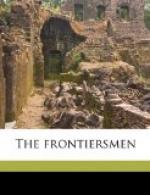Sitting here comfortably in the place of those men of the “divine fire,” Cuthbert Barnett, his rifle by his side, his knife in his belt, his coonskin cap pushed back from his face, once more florid, warm, tingling from the keen wind of the day and the change to this heated air, and with perchance a drowsy eyelid, began to marvel anew as to the fate of the cheera-taghe. Hardly a drowsy eyelid, he consciously had, however, for he had resolved that he would not sleep. His situation here alone was too dangerous; he feared wolves,—the fire that would otherwise affright them might untended sink too low. He feared also some wandering Indian. Should he be discovered here by means of the unaccustomed light he might be wantonly murdered as he slept, or in revenge for the sacrilege of his intrusion among these things that the savages had esteemed sacred.
Therefore, when he suddenly saw the cheera-taghe he saw them quite plainly. Tall, stately, splendidly arrayed in their barbaric garb, draped with their iridescent feather-wrought mantles, their heads dressed with white plumes, a staff of cane adorned with white feathers in the right hand, a green bough in the left, preceded by those curiously sonorous earthen drums, of which the drone blended with the notes of the religious song, Yo-he-wah-yah! Yo-he-wah-yah! they thrice led the glittering procession of the “holy dance” around and around the “beloved square.”
A blank interval ensued. And then again he saw them, nearer now, more distinct; they were entering the temple; they were close at hand; triumphant of mien, assured, so full of life!—he could laugh to think that he had had a dream, or had heard somehow, that they were dead or lost or vaguely gone. For here, without seeming in the least to notice his presence, they kindled anew with friction of bits of poplar or white oak the fire for the new year, the cheera, the “sacred flame,” to bear it outside to distribute it to the assembled people of Nilaque Great. Without was summer; the trees were full of green leaves; canoes were glancing along the shimmering river; the “beloved square” was crowded with braves,—he saw their feathered crests wave and glisten; the wind was blowing fresh and cool; the sun shone.
And suddenly it was shining in his face, as it came up over the Great Smoky Mountains, sending its first long slanting wintry beams through the narrow portal to the hearth where he had lain asleep before the ashes of the once “sacred fire,” covered with the fresh ashes of last night’s vigil, for they too were dead. He staggered to his feet and went out into the glistening dawn of this snowy sunlit day, hardly able to reconcile its aspect with the summer-tide scene he had just quitted. Now and again he paused, half-bewildered, as if unfamiliar with the pathetic miseries of the old “waste town”—the scene in his mind savored far more of reality.




